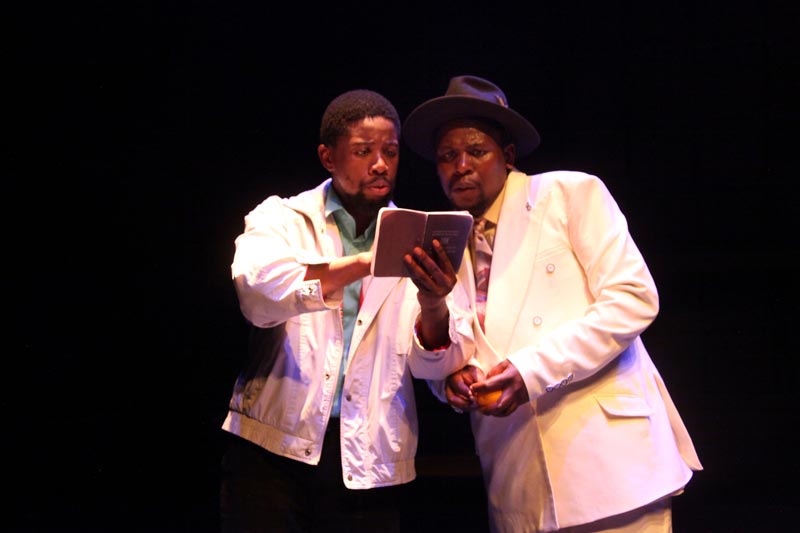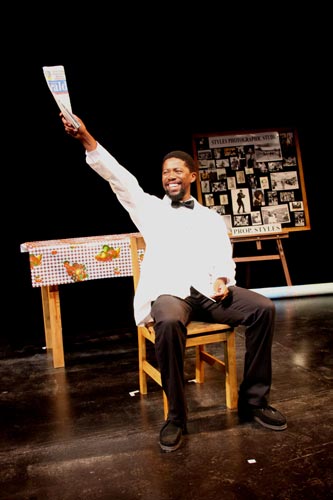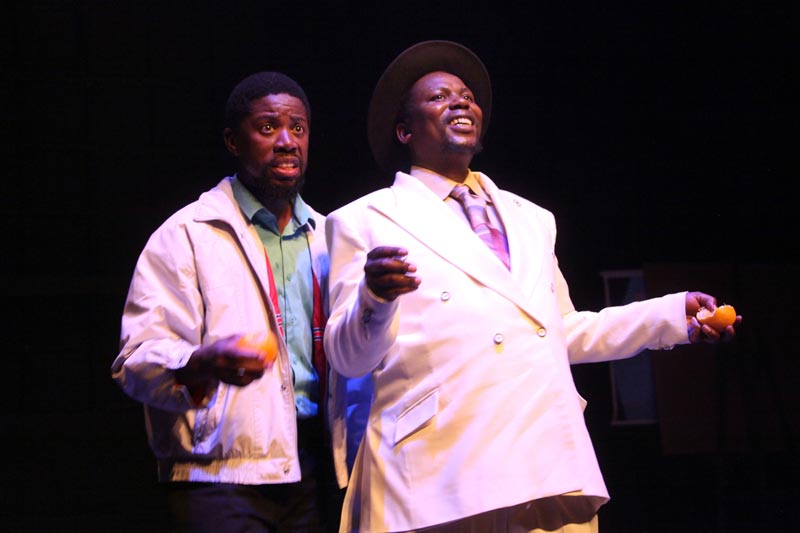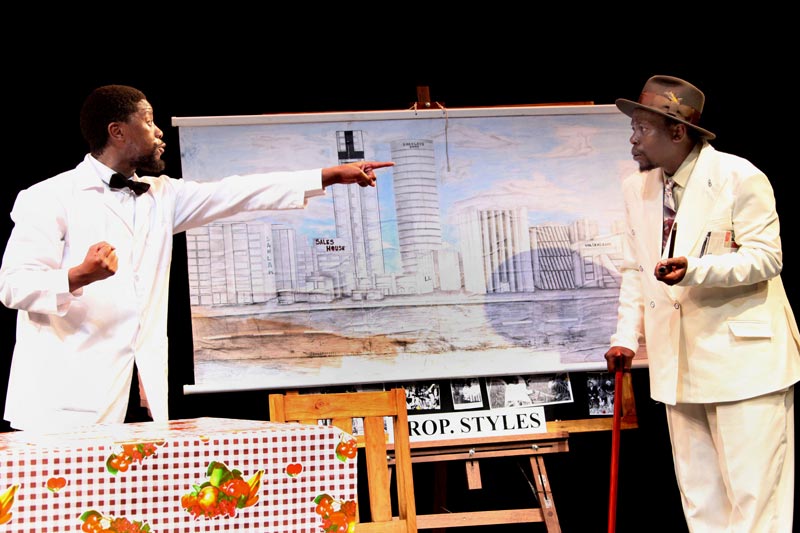"Sizwe Banzi is Dead" and the Political Power of Storytelling

“It all began with the photograph of a man with a pipe and cigarette in his mouth,” explained John Kani, one of the three writers of “Sizwe Banzi is Dead,”along with Athol Fugard and Winston Ntshona. “The question was asked: Why would a respectable man walk into a photographic studio to take a picture like that? The answer was very simple to Winston and myself — he has got his Passbook in order.
“The Passbook was the tool the apartheid regime used to control the movements of black people in South Africa,” explained Kani in the show’s program. “It was almost like a slave ring around black people’s necks identifying an individual where he or she was born, where to work, who to marry, etc.”

Photo Credit: Ruphin Coudyzer
“Sizwe Banzi is Dead” uses the Passbook as a symbol of governmental control. The play is set in a photography studio in South Africa during the time of apartheid. Having been caught without proper paperwork, Banzi must make a choice between returning to his poverty-stricken hometown and an uncertain future or risk losing everything he has in order to have the opportunity for a better life. It’s a story about identity, governmental overreach, survival, and the ultimate question: Which is worth more, one’s identity or a chance of hope for the future?
McCarter Theatre presents a revival of this legendary work in Princeton from January 16 through February 15. First staged in 1972, Kani and Ntshona who originated the roles of Styles/Buntu and Sizwe Banzi would go on to be named co-winners of the Tony Award for Best Actor in a Play in 1975. Forty years later, the play gets a new life in the post-apartheid world, thanks to an international co-production involving McCarter, The Market Theatre in Johannesburg, South Africa and Syracuse Stage.
This is not your ordinary revival; it is a landmark event. John Kani directs the play he co-created with his son, Atandwa, in the role that earned him a Tony Award. The production also includes Mncedisi Shabangu (a leading actor in South Africa) and lighting design by Mannie Manim, co-founder of the Market Theatre.

Photo Credit: Ruphin Coudyzer
“It’s an incredible A-list team - a real cultural event,” said Adam Immerwahr, Associate Artistic Director at McCarter. “One of the things that Emily Mann (McCarter’s Artistic Director) said when she first came to McCarter was that she wanted every one of our productions to be an event. We’ve held on to that mission under her leadership for these 25 years. We think it’s an important play, which is why we wanted to be part of it. To allow our Princeton audiences to get to see a production like this right here in town is what McCarter is all about.”
“Mandela subscribed to the notion that theater could affect social change, and he witnessed the ability of South African plays — including and especially ‘Sizwe Banzi’ — to build international awareness, spark outrage, and — eventually — bring the end of apartheid,” said Mann.
The seeds for the revival were planted when Nelson Mandela passed away in December 2013. Emily Mann was asked by a colleague to reflect on Mandela’s legacy to the arts in an article for The Los Angeles Times. “I was honored to write the piece and, in the process, found myself reflecting also on my own deep artistic connection to South Africa.”
“The play was originally performed in America in the seventies,” said Immerwahr. “It obviously has a different meaning and resonance now in the post-apartheid era. I recently reread it and was struck by how profound and deep it resonates with what’s going on politically in America right now. The questions of how you survive in a culture that discriminates against you and how you survive when the government itself discriminates against you—whether under the guise of law or through police brutality—are fundamental questions.”

Photo Credit: Ruphin Coudyzer
McCarter was in the midst of season planning when Mandela died and the theatre wondered how they might be able to honor his legacy. Since McCarter has had a long-standing relationship with the work of Athol Fugard during Mann’s tenure, producing several of his plays and having him on stage, the idea of reviving “Sizwe Banzi is Dead” came up. Mann had learned that her friends at The Market Theatre were planning to remount the production with John Kani at the helm, and she leapt at the opportunity to partner with Syracuse Stage to bring the production to the United States.
In the program, Kani acknowledges the heavy burden of the play on the lives of its three creators. “In 1976, after winning the Tony Award for Best Actor on Broadway in 1975, Winston Ntshona and I were arrested by the Secret Police and were detained in solitary confinement for 23 days. We were only released because of massive demonstrations by the arts fraternity all over the world. Winston, Athol Fugard, and I were like Dr. Frankenstein creating a monster that occupied our lives for more than four decades.”
Despite remaining so closely tied to the work, Kani was excited to see the play revived since it allows him the opportunity to work with younger South African actors who were not yet born when the play was first staged. To those growing up in the post-apartheid world it may appear like fiction, but for much of the audience, it is recent history with lessons that are still relevant today.
“I think it being recent history will only help audiences see analogies to race relations in our own country and beyond,” added Immerwahr.

Photo Credit: Ruphin Coudyzer
Prior to each performance at McCarter, a member of the theatre’s artistic staff will lead a 20-minute talk about the events that inspired the play, its unique creation, and its historical significance. Post-show discussions will also be held following the 7:30 p.m. performance on January 28 and following the 2:00 p.m. performance on February 1. These discussions focus on a range of topics including how artistic choices were made for the production, the actors’ process, and questions from the audience.
A special Dialogue on Drama will take place on Sunday, January 25 following the 2:00pm matinee with the director. Kani will reflect on his life and work in the theatre, his experience on the international stage, and his forty-year history with “Sizwe Banzi is Dead.” It’s a journey that continues in Princeton and one you won’t want to miss.
“Sizwe Banzi is Dead" is on stage at McCarter Theatre Center's Berlind Theatre, January 16-February 15, 2015.
